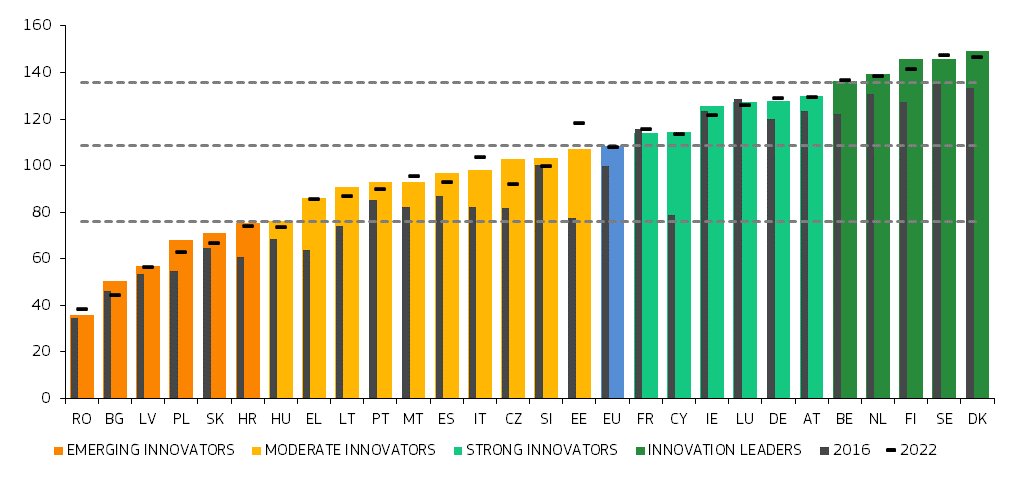The 2023 edition of the European Innovation Scoreboard and the bi-yearly edition of the Regional Innovation Scoreboard showcase that, despite the recent crises, EU Member States and their regions keep improving their innovation performance.
The European Innovation Scoreboard 2023 highlights a substantial improvement in the innovation performance of approximately 8.5% since 2016, confirming the EU’s commitment to fostering a culture of innovation. The innovation performance of 25 countries improved during this period, although at a slower pace in the more recent years, and that 20 Member States experienced a significant rise in their innovation capabilities over the past year, while only seven observed a decline. Nevertheless, countries with less strong innovation systems tend to improve less rapidly than the EU average.
The Regional Innovation Scoreboard also reports a rise in innovation performance for most of the regions in the EU since 2016. Even though innovative regions tend to be situated within the most innovative countries, some regional ‘pockets of excellence’ are found in countries with relatively lower innovation performance.
At the global level, the EU is still performing slightly better than China and is closing the performance gap with Australia, although the gap with Canada, the Republic of Korea, and the United States has expanded.
Key findings
Based on their scores, Members States fall into four performance groups: Innovation Leaders (performance is above 125% of the EU average), Strong innovators (between 100% and 125% of the EU average), Moderate innovators (between 70% and 100% of the EU average) and Emerging innovators (below 70% of the EU average).
Denmark is the new top innovator, while Sweden, which had topped the board in the last few years, is coming second. Other Innovation Leaders are Finland, the Netherlands, and Belgium.
Austria, Germany, Luxembourg, Ireland, Cyprus, and France are Strong innovators, performing above the EU average.
Estonia, Slovenia, Czechia, Italy, Spain, Malta, Portugal, Lithuania, Greece and Hungary are Moderate innovators. Croatia, Slovakia, Poland, Latvia, Bulgaria and Romania are Emerging innovators.
This divide emphasises the need for targeted efforts to bridge the innovation gap and foster equitable growth across the EU, which is one of the goals of the New European Innovation Agenda, adopted in July 2022. Through strategic initiatives like the Deep Tech Talent Initiative, the Innovation Talent Platform, and the Regional Innovation Valleys, the EU aims to foster deep tech innovation and promote a start-up culture. By investing in deep tech talent, fostering innovation ecosystems, and leveraging regional strengths, countries or regions can drive technological advancement, and maintain a competitive edge in the global innovation landscape.
Source: European Commission | Press Corner (https://shorturl.at/ghlFI)
